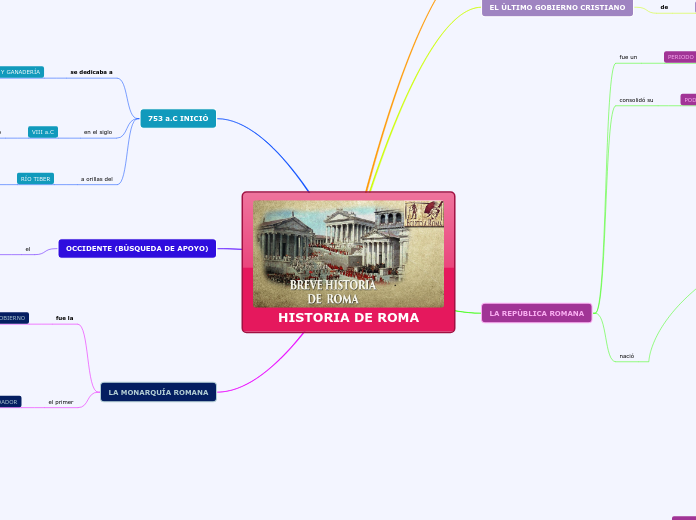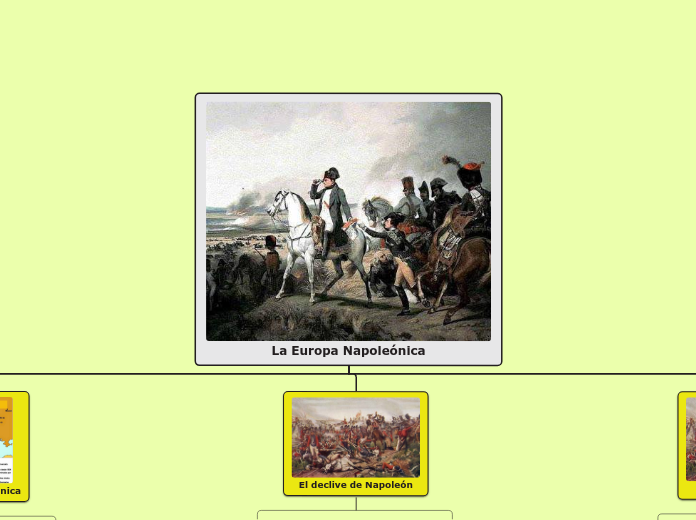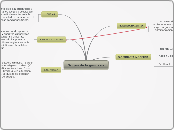HISTORIA DE ROMA
A noun is a word that functions as the name of some specific thing or set of things, such as living creatures, objects, places, actions, qualities, states of existence, or ideas.
LA MONARQUÍA ROMANA
Generic nouns are nouns that are part of a generic statement. Generic nouns can be singular or plural. The opposite of generic nouns is collective nouns.
The difference between definite/indefinite and generic nouns is that in the sentence there must be a blanket statement or question.
el primer
REY FUNDADOR
CIUDAD DE ROMA
dividió a
ROMANOS
TRES TRIBUS
SABINOS
RESTO
RÓMULO
estableció
INSTITUCIONES
AUGURES
parte de
LA RELIGIÓN ROMANA
quien en el
AÑO 753 a.C
comenzó a
CONSTRUIR LA CIUDAD
sobre la
MONTE PALATINO
luego decidió
POBLAR LA CIUDAD
y
ACEPTANDO TODO TIPO DE EJEMPLO
716 a.C
murió de
54 AÑOS
DIVINIZADO
con el
DIOS DE LA GUERRA
fue la
PRIMERA FORMA POLÍTICA DE GOBIERNO
desde el
MOMENTO LEGENDARIO
de su fundación del
21 DE ABRIL DEL 750 a.C
hasta el fin de
LA MONARQUÍA
510 a.C
OCCIDENTE (BÚSQUEDA DE APOYO)
Proper nouns are the names of specific people or places. They should always begin with a capital letter.
el
CISMA
entre las
IGLESIAS
habían mantenido a
CONTANTINOPLA
distante de las
NACIONES OCCIDENTALES
durante los
ASEDIOS
TURCOS MUSULMANES
no habían
INDIFERENCIAS DE ROMA
y sus
ALIADOS
EMPERADOR JUAN VIII
murió en
1.448
y su
HERMANO CONSTANTINO XI
además
ASUMIÓ EL TRONO
al
AÑO SIGUIENTE
promovió un
CONCILIO
FERRARA
donde se
RESOLVIERON
las
DIFERENCIAS
DOS CONFESIONES
era una
FIGURA POPULAR HABIENDO LUCHADO
RESISTENCIA BIZANTINA
POLOPONESO
frente al
EJÉRCITO OTOMANO
ORTODOXA
CATÓLICAS
753 a.C INICIÓ
A concrete noun is a noun that can be identified through one of the five senses (taste, touch, sight, hearing, smell).
a orillas del
RÍO TIBER
se sabe que
ROMA
fue fundada en
FORMA PROGRESIVA
por las
TRIBUS LATINAS
generaria de
SIETE COLINAS
mediante la
CREACIÓN DE PEQUEÑAS ALDEAS
que terminaron por
FUNCIONARSE
SIGLO IX Y VIII a.C
en el siglo
VIII a.C
terminó en el año
por la
CAÍDA DEL IMPERIO ROMANO
ocurrida el
29 DE MAYO
HECHO HISTÓRICO
que puso fin al
ÚLTIMO VESTIGIO
IMPERIO ROMANO EN ORIENTE
marcó el fin
EDAD MEDIA
EUROPA
ORIENTE
se dedicaba a
AGRICULTURA Y GANADERÍA
presentaban un carácter
LOCALISTA
COMUNAL
LA REPÚBLICA ROMANA
Countable nouns are nouns that can be counted, even if the number might be extraordinarily high.
Uncountable nouns are nouns that come in a state or quantity which is impossible to count; liquids are uncountable, as are things which act
like liquids.
IMPERIO
BAJO IMPERO ROMANO
trajo con ello
CRISIS POLÍTICAS
TEOSODITO
394-395
DINASTÍA VALENTIANA
364-394
DINASTÍA CONSTANTINIANA
305-363
DIOCLESIANO Y TRETARQUÍA
284-205
hubo
AGRAVAMIENTO
de los
CRISIS RELIGIOSAS
tuvo un
COLAPSO DEL SISTEMA ESCLAVISTA
causada por
FIN DE LAS GUERRAS
tenía
ORÍGENES
CESE
de las
GUERRAS DE CONQUISTA
CONSECUENTE REDUCCIÓN
del
NÚMERO DE ESCLAVOS
comienza en el
SIGLO III
CRISIS DEL IMPERIO
sacudiendo cuestiones
RELIGIOSAS
POLÍTICAS
MILITARES
ECONÓMICAS
ALTO IMPERIO ROMANO
que duró
250 AÑOS
su
MAYOR EXPONENTE
se entró en el
EMPERADOR OCTAVIO AUGUSTO
quien
ALENTÓ
COMERCIO
INDUSTRIA
AGRICULTURA
HIZO GRUPOS SOCIALES
ESTIMULÓ LAS ARTES
CREÓ GUARDIA PRETORIANA
FORTALECIÓ LA VIGILANCIA
CONSTRUYÓ OBRAS PÚBLICAS
PROMOVIÓ REFORMAS SOCIALES
consolidó su
PODER
en el
CENTRO DE ITALIA
SIGLO V a.C
y entre
SIGLOS IV Y III a.C
se impuso como
POTENCIA DOMINANTE
PENÍNSULA ITÁLICA
UNIFICANDO
SOMETIENDO
fue un
PERIODO
de la
HISTORIA ROMANA
caracterizada por el
RÉGIMEN PUBLICANO
que se extiende
DESDE 509 a.C
cuando
FINALIZÓ LA MONARQUÍA ROMANA
con la
EXPULSIÓN DEL ÚLTIMO REY
llamado
REY LUCIO TARQUINIO EL SOBERVIA
hasta el
27 a.C
EL ÚLTIMO GOBIERNO CRISTIANO
Common nouns are words for people, places or things that aren’t specific (as opposed to a proper noun which refers to only one person, place or thing).
Common nouns can be countable or uncountable, singular or plural.
de
CONSTANTINOPLA
CONSTANTINO XI
que junto a su
VALENTÍA
CAÍDA DE LA CIUDAD
la
CONSOLIDÓ
FIGURA LEGENDARIA
en las
HISTORIAS POSTERIORES
y el
FOLCLORE GRIEGO
nació
6 DE MAYO DE 1.449
murió
29 DE MAYO DE 1.453
fue conocida como
EMPERADOR CONVERTIDO EN MARMOL
gobernó desde
1.449
hasta
SU MUERTE
en la
BATALLA
durante
LA CAÍDA DE CONSTANTINOPLA
en
1.453
marcó el
FINAL DEL IMPERIO BIZANTINO
SU SURGIMIENTO
A noun which refers to a group of things/people.
fue
NACIDA
como una
HUMILDE CIUDAD Y ESTADO









